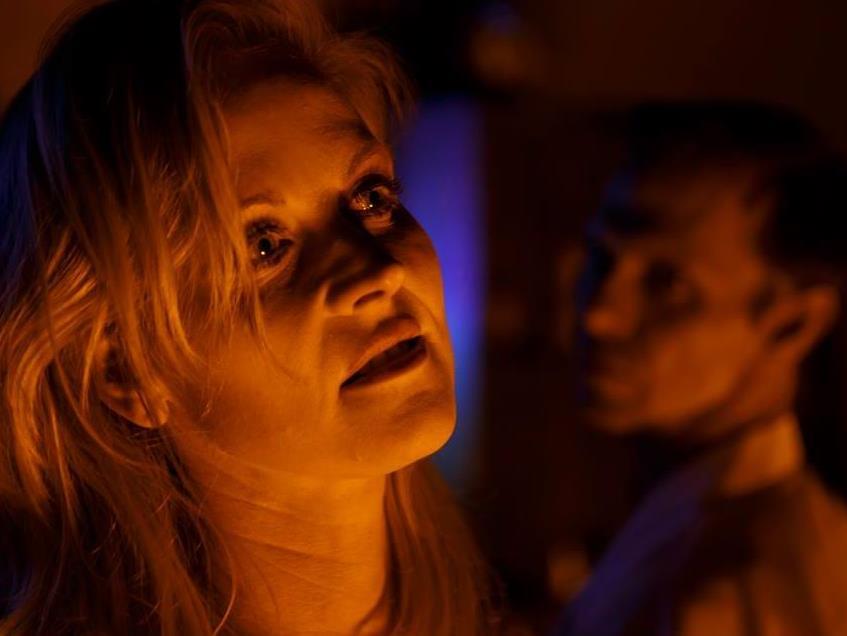Image: Louise Crawford and Philip Claassen in demens photograph by Michael Foxington.
Combining the words ‘demons’ and ‘dementia’, Amedeo Astorino’s demens is a dark, unnerving piece of theatre that explores the horrors that simmer inside the minds of seemingly sane people. Demens attempts to cover an array of confronting themes in the space of a 90-minute performance.
Lilith (Louise Crawford) and Allan (Jai Luke) are patients at a psychiatric asylum, where they struggle with their respective mental illnesses while fighting against the corrupt actions of the staff responsible for their care. Dr Osmond (Don Bridges) and his nurse associate Gabriel (Philip Cristian Claassen) also have their own demons to face. And their positions of power lead to some particularly uncomfortable interactions with their vulnerable prisoners.
The dialogue-heavy plot of demens focuses on the lives of the characters, exploring their backgrounds and the various events that have led them into the confinement (both literal and figurative) they have found themselves in. Unfortunately, the efforts to create a thought-provoking performance are marred by the overdramatic nature of the script. Although some of the dialogue does help to structure the characters’ stories and unravel the secrets they are hiding about themselves, it lacks a rawness that a play about mental illness truly needs. It is difficult to sympathise with their various psychological conditions as they never feel overly real; they are frustratingly unrelatable even if their trauma isn’t.
This is not the fault of the performers. On the contrary, they are genuinely talented and work very well with the material they have. Crawford is a standout with her portrayal of Lilith, the sarcastic blonde sporting a fresh black eye, who has returned to the asylum following an incident of self-harm. She is a strong actor and captivating to watch even when she is not the main focus of the scene. Allan is energetically performed by Luke, who adds some humour to an otherwise serious play. Luke combines enthusiasm and anxiety commendably, and the manner in which he transforms from Allan to his alter-ago Stanley is effortless.
Claassen and Bridges each do a solid job of portraying disturbing and creepy characters, however the play itself does not allow their characters to develop in the same way as Lilith and Allan. Claassen is a religious narcissist as Gabriel, a nurse who revels in controlling his patients, and although the performance does endeavour to provide some clarity on why he is the way he is, Gabriel’s over-the-top personality makes it difficult to feel either sympathy or fear towards him. This stems from the content of his dialogue and his movements around the stage, which are both quite forced. Bridges’ years of acting experience shine through in Dr Osmond, who has an alarming fixation with ‘tantalising’ young men, but his performance is restricted by the awkward conversations and cringeworthy jokes his character is scripted to have.
Director Natasha Broadstock has been involved in many dark and unnerving shows over a 35-year career, and so it is little wonder she was drawn to the chilling premise of demens. Her strength lies in the way she manipulates her actors to create beautiful physical shapes; every moment within the play makes for a meaningful photograph as the characters’ gestures and expressions are very well structured. However, at times it feels as though the focus is on creating perfect dramatic composition rather than clear and honest character interactions, and this prevents any significant emotional connection forming between the troubled characters and the audience.
The set is the visual highlight of the play. Harry Paternoster has brilliantly matched the Bluestone Church Arts Space venue to the religious undertones of the performance. The glowing stained glass window centrepiece, the white wooden thrones, the obtrusive red ladder and the solitary single bed create an eerie isolating atmosphere, enhanced even further by imagery projected onto the plain wall backdrop (created by Mad Alice Media).
The lighting and sound design could have been more subtle, as many of these effects were a confusing distraction from the performance itself. Apart from when it was used to help differentiate between Allan and Stanley, the colourful lighting schemes were often unnecessarily obvious and would have been more effective if they blended in with the onstage action rather than detract from it.
Interpreting mental illness in theatre certainly has its challenges. There are so many facets to explore that it is a huge endeavour to create a work that has a clear focus and a consistent approach. demens lacks consistency in that it attempts to cover too many confronting themes at once, and in doing so, struggles to form a strong thought-provoking connection between the onstage action and the audience.
The various storylines do not seamlessly intertwine, and while the performances by the actors are strong, the script does not allow the potentially intricate stories of the characters to truly develop.
Rating: 2.5 stars out of 5
demens
Cast
Lilith: Louise Crawford
Gabriel: Philip Cristian Claassen
Allan: Jai Luke
Dr Osmond: Don Bridges
Director: Natasha Broadstock
Writer: Amedeo Astorino
Designer: Victoria Haslam
Set: Harry Paternoster
Photographer: Michael Foxington
Lighting designer: Matthew Barber
Sound designer: Lindon Blakey
Lighting/sound operator: Nicholas Moloney
Projections: Mad Alice Media
Publicity: Kris Weber
A Curious Cat production
Bluestone Church Arts Space Footscray
14-24 July 2016





